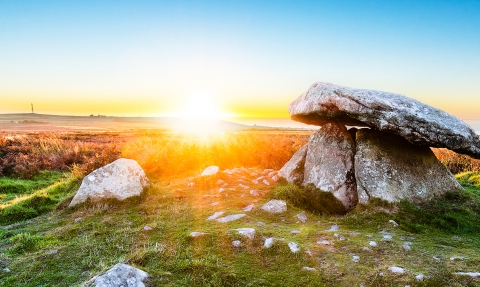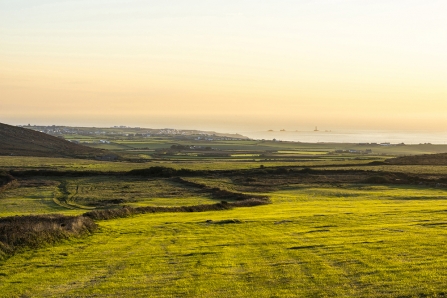
Chun Quoit sunset by Ben Watkins
Cornwall Wildlife Trust supporting climate change action
Climate change in Cornwall is expected to bring sea-level rise and an increase in the intensity of both rain and drought - both of which will increase the pressures on Cornwall’s wildlife and wild places which are already in decline.
Given the threats posed by climate change, Cornwall Wildlife Trust is fully supportive of the declarations of climate and ecological crises being made across Cornwall by organisations, community groups and businesses large and small, and the action plans being developed.
Cornwall Wildlife Trust is working towards a wilder future for Cornwall, with our staff, volunteers and community groups already delivering a range of projects which are both good for wildlife and also good for climate change. These include:
- Creating wilder land and seas across Cornwall. Our 59 nature reserves provide space for nature to store carbon and we plan to expand the area of land we own and explore rewilding opportunities. The more we improve the condition of habitat on land and at sea, the greater the potential for carbon storage in that habitat. Our nature reserves are also important wildlife corridors, linking habitats and providing safe havens of diverse habitats for wildlife to recover from the impacts of climate change.
- Natural solutions to climate change. Climate change is expected to increase sea levels and the intensity of rain and weather events, including droughts. There is growing recognition that changes to how we manage land can provide us with natural solutions to the climate crisis, such as increasing tree cover, restoring peatlands, protecting marine habitats and better managing agricultural soils work by capturing and storing carbon dioxide from the atmosphere. Natural solutions can also help to tackle the ecological crisis by enhancing and expanding wildlife habitats and improving their resilience (think beaver-created wetlands preventing spread of wild fires). With support from South West Water, we work with farmers and landowners across Cornwall to support land and agricultural management which slows the flow of water across the land, and improves soil health. Slower water has less impact on our soils than fast water, which can destroy habitats and wash soil and nutrients quickly out to sea. We are also increasing our work with developers and Cornwall Council to ensure that new housing meets new quality standards which are good for water, wellbeing and wildlife
- Understanding the impact of climate change on our wildlife. Because of Cornwall’s geographical location and maritime climate, Cornwall is often the first and the last places for wildlife to be found in the UK, particularly migratory birds and insects. We work with our network of environmental scientists, community groups and volunteers to build up environmental records to understand how conditions for wildlife change over time.
- Safeguarding our rare species. Cornwall’s unique geology and warm climate mean that it is home to some globally rare species and habitat. We will continue to gather information on these species to understand the impact of climate change and explore measures to help them adapt.
- Understanding the arrival of new species. Warmer climates and extreme weather can bring new plants and animals to Cornwall, and their impact on existing wildlife and wild places needs to be understood and managed. The recent example of Pacific Oysters smothering rocks across Cornwall is likely to be exacerbated by climate change and there are many historic examples, including Japanese Knotweed.
- Connecting people with nature. We campaign and raise awareness of the importance of nature for our health and wellbeing. We encourage wildlife actions big and small, such as wildlife gardening or making a pond, so that our members, community groups and other organisations can help wildlife adapt and thrive in the face of the challenges that climate change will bring.
- Wildlife-friendly, lower-carbon economy. We support and advise businesses and landowners whose activities impact on our land, rivers, and seas to help them work with Cornwall’s natural resources and conditions. We show how wildlife-friendly and less intensive business practices can bring financial as well as environmental benefits.
- Net-zero Cornwall Wildlife Trust by 2030. We will continue to look at the carbon and environmental impacts of how we manage our own nature reserves, how we deliver our conservation projects and how we run our charity. We are developing an action plan for Cornwall Wildlife Trust to become carbon zero by 2030.

